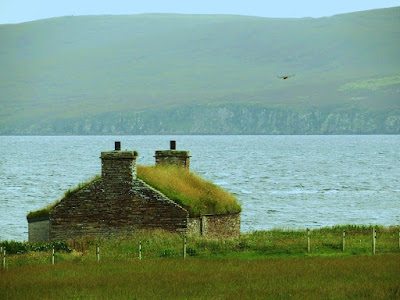Graemsay is a small, scarcely populated island in the Orkney archipelago, south of main Orkney, from where Stromness, Kirkwall and St. Margaret's Hope towns have been reported here at Ultima Thule.
Graemsay, Orkney Islands
Coordinates: 58º 56' N, 03º 16' W
Population: ~ 25-30
The island is approximately 2 miles from east to west and one mile from north to south. The highest point is only 62 metres above sea level. The centre of the island is rough grass and heather moorland. Its two major lighthouses guide ships navigating to the harbour of Stromness.
Hoy High Lighthouse and the Sandside farm site.
Sandside is rightly by the side of a fine stretch of sand.
The building of the lighthouses, Hoy High and Hoy Low, was a major development on the island; they were first lit in 1851. Situated at either end of the island, the two towers were joined by a paved road which benefitted all inhabitants.
[S.T.] Hoy High lantern and the view.
Hoy Low.
If both lights are kept in line, it ensures a safe passage through the tricky Hoy Sound. They were designed by Alan Stevenson, of the Stevenson family of lighthouse builders.
[S.T.]
Graemsay is probably one of the least visited of the Orkney Islands . There is no shop or café on the island and no heritage centre, so there isn't much for visitors to do apart from walk. And enjoy the flowering grasses or the sea.
[S.T.]
The lighthouses are the larger buildings on the islands, as just a few small farm houses survive at Sandside, besides ruins and abandonned school and church.
The old school, now closed.
The primary school closed in 1996 and the island's children travel daily by boat to school in Stromness on the ferry.
[S.T.] The old Kirk
There are 12 inhabited houses and some 25 to 30 people living in Graemsay. They were over 200 during the 19th century, but that was much more than the island could sustain.
The house of Sian Thomas was the Sandside Farm manor house.
As Graemsay is no tourist attraction, it's hard to find decent images and data from there. Most of this post and its photos are taken from Sian Thomas, who publishes on her ' Life on a small Island ' blog. I want to thank her for the permission. The images marked S.T. were borrowed from her blog.
[S.T.]
The Comunity Hall
[S.T.] Most events and meetings take place at the Community Hall - a small Army hut from WWI.
[S.T.] Halloween Party at the Hall.
[S.T.] Story Telling
There are some fine landscapes to enjoy, biking is mandatory !
[S.T.]
Turfed roof house
The sea is probably the main character and the real star of Graemsay.
[S.T.]
But other good things come from land:
[S.T.] Gooseberries
[S.T.] " Button", Sian's house cat, is like the 'Queen' of Graemsay :)
The islanders are served by the passenger ferry MV Graemsay from Stromness.
The Graemsay ferry pier, with the waiting room shed.
Probably the most lively spot on the island, when the ferry arrives from Stromness.
MV Graemsay.
.
The arrival of the last ferry around 18.00 h brings Graemsay residents back home from work or from classes.
[S.T.] The famous sunsets of Graemsay
If you look for nature's bauties, maybe there is one good reason to visit Graemsay in spring: the rich variety of wild flowers covering the grass and the marshes. Just a few of them:
Wild primrose (*)
Yellow flag
Marsh Orchids
Marsh Regwort
Red Campion
Tormentil, or Potentilla
Cow Parsley
Starling among daisies
[S.T.]
I think Graemsay is a Ultima Thule site in its own right; I hope to contribute for an increase of visitors !
(*) See comment below








































